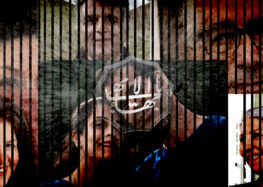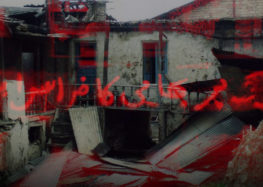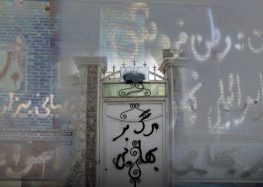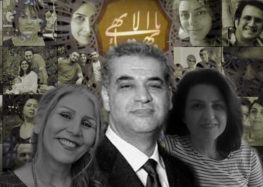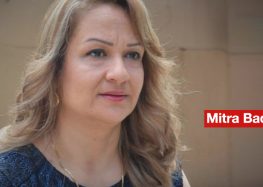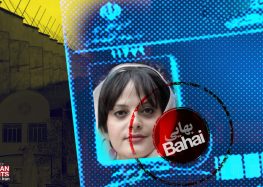After 10 Years in Prison, Faith Leader Fariba Kamalabadi Says Baha’is Hope to Serve Iran

In her first interview since being released from Evin Prison on October 31, 2017, Baha’i faith leader Fariba Kamalabadi said Baha’is “love” Iran and want to “serve” their country.
“There have been a lot of reports about the rights that have been denied to Baha’is,” Kamalabadi told the Center for Human Rights in Iran (CHRI) on November 1. “But no one has talked about the right to serve Iran, which is the right of every Iranian and the dream of every Baha’i in Iran.”
“A lot of people might think that 10 years in prison would drain your strength, but now that I am out of prison, it is the wish of myself and other Baha’is to be able to serve the holy land of Iran, to repay what is due as a patriot, and to earn the right to serve Iran.”
Kamalabadi, 55, is the second of seven imprisoned Baha’i faith leaders to be released from prison in Iran. Mahvash Sabet, 64, was freed on September 18, 2017.
The leaders, known as Yaran (“the friends”), were arrested between March and May of 2008, and initially sentenced to 20 years in prison each for several national security charges, including “collaborating with enemy states,” “insulting the sacred” and “propaganda against the state.”
Their sentences were later reduced to 10 years in prison each based on Article 134 of Iran’s Islamic Penal Code, which allows prisoners to serve only the longest sentence in cases involving convictions on multiple charges.
Speaking to CHRI on the phone from her home in Tehran, Kamalabadi said Iran’s Intelligence Ministry had cleared the Baha’i leaders of allegations of espionage.
“I remember when our lawyer was defending us in court, he thanked the Intelligence Ministry for submitting a letter from its counter-intelligence division stating there was no evidence linking us to espionage,” she said. “That’s a clear fact.”
Iran’s Constitution does not recognize the Baha’i faith as an official religion. Although Article 23 states “no one may be molested or taken to task simply for holding a certain belief,” followers of the faith are denied many basic rights as one of the most severely persecuted religious minorities in the country.
“I think by now, the Iranian people know that Baha’is seek nothing other than universal human solidarity and peace,” said Kamalabadi. “That’s their goal, wherever they may be, especially in their country. Iran is their homeland. They love Iran. They love Iranian Muslims. They love Mecca, which they consider to be a holy pilgrimage site. Iranian Baha’is have all this love for the holy land of Iran. We wish to serve Iran.”
“It’s true that we have a positive outlook towards all the difficulties and severities of life, but the truth is that those years in prison have been lost,” she said. “It is the same for others who have small children, unfortunately. Azita Rafizadeh and her husband are in prison simply because she was teaching computer science to Baha’is who were denied university education. Their children, who are very young, have been separated from their parents.”
Baha’is are denied the right to higher education in Iran, either by being banned from enrolling in university or suddenly being expelled after enrolling.
Since 2015, Rafizadeh and her husband, Peyman Koushk-Baghi, have been serving prison sentences of four and five years respectively for working as instructors at the Baha’i Institute for Higher Education (BIHE), a banned online university in Iran.
“Each of us Yaran have endured ten years in prison,” Kamalabadi told CHRI. “We hope these 70 years will pave the way to end misunderstandings. We hope that after the release of the other Yaran, the problems facing the Baha’i community will soon go away.”
She continued, “The Baha’i faith is a religion and all religions in the beginning had to endure hardships because of misunderstandings. That’s how we view our hardships. Yes, it’s hard, very hard. It’s hard to be imprisoned, even in the best of prisons. It’s hard to be separated from your loved ones. But despite all this hardship, we Baha’is love the holy land of Iran. We would love to serve Iran so that these things don’t get repeated for our children and our compatriots.”
In her interview with CHRI, Kamalabadi also discussed her controversial meeting with her former cellmate, political activist Faezeh Hashemi, the daughter of former President Akbar Hashemi Rafsanjani.
The visit at Kamalabadi’s home in May 2016, while she was home on a five-day furlough from prison, angered Iran’s Shia political and religious establishment.
Iran’s Supreme Leader Ali Khamenei has declared Baha’is “unclean” and forbidden Muslims from having contact with them.
“I was totally expecting Faezeh to come visit me,” she said “I expected to see all my other former cellmates, too. When you are together in prison, you are a family.
“Fortunately, everyone in prison has to live together regardless of religion or beliefs. They come to love each other as human beings, like members of a family,” she added. “It is our hope that this model relationship that was developed in prison will extend beyond prison. We are members of one family.”

